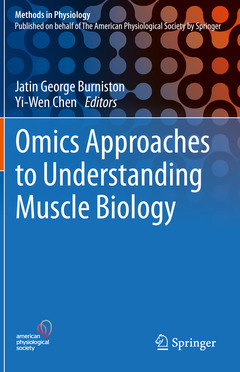Description
Omics Approaches to Understanding Muscle Biology, 1st ed. 2019
Methods in Physiology Series
Language: English
Subjects for Omics Approaches to Understanding Muscle Biology:
Publication date: 11-2020
217 p. · 15.5x23.5 cm · Paperback
Publication date: 11-2019
217 p. · 15.5x23.5 cm · Hardback
Description
/li>Contents
/li>Biography
/li>Comment
/li>
Presenting the latest research techniques, this book is a valuable resource for the physiology community, particularly researchers and grad students who want to explore the new opportunities for omics technologies in basic physiology research.
Part I: Genomic and Epi-genomic.- 1) GWAS/muscle function and diseases (by Eric Hoffman).- 2) Whole genome and whole exon sequencing/muscle disorders (by Silvère van der Maarel and Richard Lemmers).- 3) Epi-genome approaches/muscle regeneration (by Vittorio Sartorelli).- Part II: Transcriptomic.- 4) RNA profiling (by Yi-Wen Chen, confirmed).- 5) miRNA profiling (by Alyson Fiorillo).- 6) Single cell profiling in muscle (byPier Lorenzo Puri).- 7) Statistics and bioinformatics (by Heather Gordish).- Part III: Proteomic.- 8). Proteome profiling of human/ clinical samples – i.e. necessarily label-free techniques (by Lawrence Mandarino).- 9) Proteome profiling of cell and animal models – i.e. label techniques such as SILAC (by Matthias Mann OR SILAM with JR Yates III).- 10) Global analysis of post-translational modifications (by David E James).- 11) Proteome dynamics – synthesis and degradation on a proteome wide scale (by Jatin Burniston, confirmed).-Part IV: Metabolomic.- 12) Non-targeted metabolomics using mass spectrometry (by Charles Burant).
Comprises research, that spans all levels of biological organisation, including DNA, RNA, protein and metabolite
Combines different OMICS approaches under the unifying theme of skeletal muscle physiology
Broadens the understanding of big data usage in physiology research
These books may interest you

Muscle Atrophy 232.09 €



